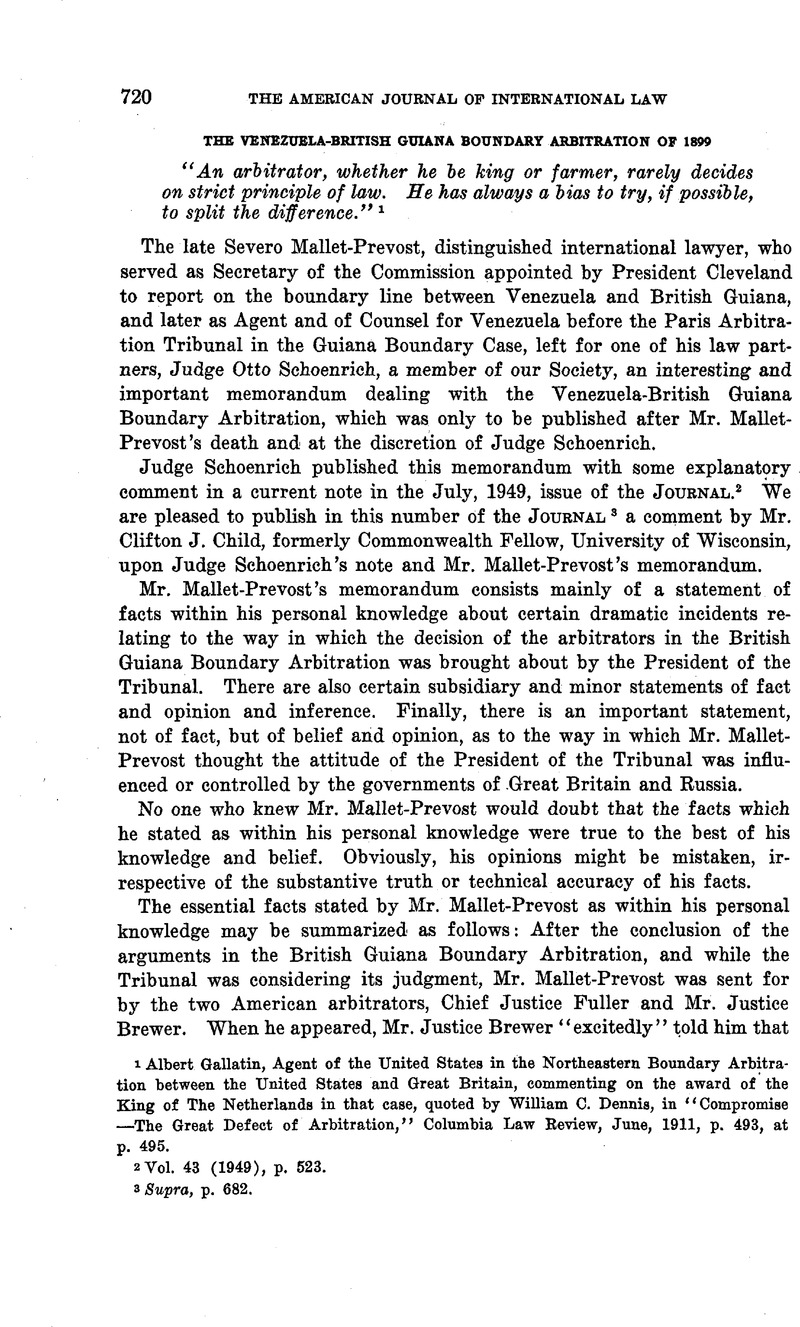Published online by Cambridge University Press: 20 April 2017

1 Albert Gallatin, Agent of the United States in the Northeastern Boundary Arbitration between the United States and Great Britain, commenting on the award of the King of The Netherlands in that case, quoted by William C. Dennis, in “Compromise —The Great Defect of Arbitration,” Columbia Law Review, June, 1911, p. 493, at p. 495.
2 Vol. 43 (1949), p. 523.
3 Supra, p. 682.
4 This JOURNAL, Vol. 43 (1949), p. 530.
5 Ibid.
6 And even as to him, see infra, p. 726. 7 See this writer's article in Columbia Law Review, June, 1911, p. 493, cited supra.
8 “Indeed, was it not M. de Martens' desire for unanimity which caused him, in bringing both parties to accept a compromise, to put pressure upon the British judges, as well as upon their American colleagues?” Supra, p. 689.
9 Mr. Child, supra, p. 683.
10 Ibid.
11 Mr. Child, supra, p. 689. Cf. Mr. Justice Brewer, quoted by Judge Sehoenrieh, loc. cit., p. 526; the Honorable John W. Foster, Proceedings of the American Society of International Law, 1909, p. 28; article, “Compromise—The Great Defect of Arbitration,” Columbia Law Review, June, 1911, pp. 495, 496, etc.
12 In like manner, any charge in 1899 by Mr. Mallet-Prevost and General Harrison of a diplomatic “ d e a l “ under the circumstances then obtaining, and in view of the honorable obligations by which they were bound, would have been unthinkable.
13 Child, supra, p. 683. Cf. Mr. Child's statement, “ It was perhaps only to be expected that some day, after turning the matter over in his mind for so long, Mr. Mallet-Prevost would eventually produce a theory to justify the attack which he and General Harrison, the senior Counsel for Venezuela, launched upon the Tribunal immediately after the award was announced on October 3, 1899.” Supra, p. 682.
14 Child, supra, pp. 684, 685.
15 Child, supra, pp. 691-693.
16 Neither is it surprising that if there was a diplomatic “deal“—which the writer does not believe—the parties to this “ deal “ left no written record of their misconduct for the diligence of Mr. Child to discover.
17 Child, supra, p. 683.
18 Supra, pp. 682, 683.
19 Child, supra, p. 686.
20 Ibid., p. 689.
21 Proceedings of the American Society of International Law, 1909, p. 28.
22 Proceedings, National Arbitration and Peace Conference, April 15, 1907, p. 44; quoted article, “Compromise—The Great Defect of Arbitration,” loc.cit., p. 495, note.
23 Quoted by John W. Foster, Proceedings of the American Society of International Law, 1909, p. 27.
24 Columbia Law Review, 1911, p. 493, at pp. 496, 502.